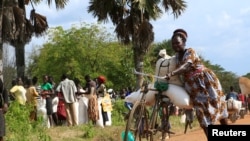U.N. agencies warn millions of people in South Sudan will face acute shortages of food by the end of July, with tens of thousands experiencing famine-like conditions. A new report released Friday by the U.N.’s World Food Program, Food and Agriculture Organization and UNICEF, along with the government of South Sudan, assesses the food situation in the world's youngest country.
Food is always in short supply during South Sudan’s lean season. But, this year, the situation is worse than usual because of a much-delayed rainfall on top of an economic crisis and population displacement due to conflict.
The United Nations estimates nearly 7 million South Sudanese, or 61 percent of the population, will face acute levels of food insecurity in about six weeks' time.
World Food Program spokesman Herve Verhoosel tells VOA the crisis will be especially dire for thousands of people living in inaccessible parts of former Jonglei, Lakes, and Upper Nile states.
“Twenty-one thousand people in the country are in a very catastrophic situation. They need very urgently access to that food," said Verhoosel. "We know that urgent food assistance is needed in most of the country, especially because of the conflict and because of the season. And, that is at the end of July that we will have a very difficult time and most of the people will need that food assistance.”
Verhoosel says people living in the worst-affected areas are experiencing famine-like conditions, with little or nothing to eat or to feed their families. The agency currently is providing food for 2.77 million people. Verhoosel says the WFP plans to scale up aid to reach more than 5 million by the end of the year.
The U.N. children’s fund and partners say they too will scale up services to reach more children affected by severe acute malnutrition with therapeutic feeding.
The Food and Agriculture Organization reports it is providing new varieties of seed suited to local conditions. It says it also is training farmers in techniques that will reduce losses from drought and flooding.




